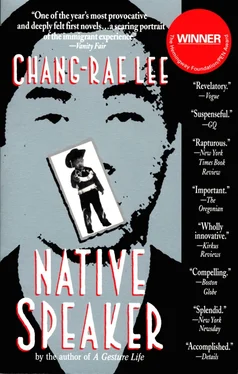Out in the world, John Kwang is falling. His name is diving in the polls; not just in one poll but across the board, the news-organization polls, the radio call-in polls, the 900-number talk show polls which you can call into and vote on what he should do. We know he still has plenty of supporters, but they’re mostly silent, and the scope of the questions keeps growing. Reporters call everyone on the staff, phone us at the office, suggesting unceasingly how it must involve money, it must involve money.
You click them off as fast as you can. There’s only a skeleton crew working, even during the day, when the hourly barrage of calls comes in. Requests and repeated requests, reporters at the basement door posing as utility men, utility women, they’re at the point where they simply want to get inside the walls. Suddenly this has become enough for them, the new low standard, just to see where he’s hiding, get the feel of the cell, the bunker.
I stay close to him, as Janice asks. Practically no one else sees him, sometimes Sherrie, though even she has begun to distance herself, drop away. More and more it is Janice who is directing the daily operations, actually there at the house urging the rest of us on. He has sent May and the boys and a helper to their other house, upstate. They don’t have a television up there, they don’t have a radio. They don’t need to see their father like this.
I think John Kwang would be a man to keep his boys close, keep May even closer, that he would collect the four of them in one shut-away room and have them sleep and eat and bathe all together until the tempests subsided. His move is more what my father would do, what I have learned, too, through all of my life. To send people away or else allow them to go, that what is most noble to me is the exquisite gift of silence. My mask of serenity and repose.
Tonight, while I’m working in the makeshift rooms of his basement, he comes down the stairs in his plaid pajamas and white robe, with his hair pressed to a funny shape by sleep, and sits in the corner armchair with two goblets and a bottle of scotch.
“Byong-ho,” he now calls me, his voice like a bassoon. And he says in satori-accented Korean, Hey you, arrogant youth, stop doing all that work and come drink with an elder .
I rise and wheel the desk chair to the corner, take my glass, let him pour. I don’t really drink, just let the liquor sting my tongue. I sit for him. His thick white robe is monogrammed, JK, in light blue stitched above his left breast, and for a moment, with the heavy drink in his hand, he almost looks like those men who lounge for hours in the locker room of a midtown university club and scratch their bared balls and watch FNN and pop cashews and snicker about black athletes and fool colleagues and all the fat-assed women they have loved. But John doesn’t feature the polished ivory potbelly, the connected nests of body hair, a booming pepper-grinder voice; he’ll sing instead. He always jury-rigs a folk song onto his stories. I don’t know any of his songs, but it’s the same register my mother used to hum while doing the housework, a languorous baritone, the most Korean range, low enough for our gut of sadness, high for the wonder of chance, good luck.
“Don’t you know any Korean songs?” he asks.
“The only one is Arirang ,” I tell him. “Then only the tune, and the first few words.”
John nods, rocking ever gently.
“Listen to the melody,” he says. He hums a few bars, to the first refrain. The tune, somehow, is immediately wrenching, its measures plead in near arpeggios, and like any good folk song it makes the voice of its singer sound lost, or forlorn, incomplete. “Imagine,” he goes on, “that that could be the spirit of an entire country. You do it.”
I sing the words until the second stanza, when I can’t remember them.
Ah, yes , John intones, his Korean accent getting thicker and heavier. I have some trouble understanding him. He leans back now, his slippered feet bobbing, the drink maybe getting to him, and he says, You’ve almost got it, there, but something is still missing. You’re cheating its sweetness. Let me show you. A different song now. A very old one I know .
He sings with his eyes shut tight, the way I would see old Koreans praying in the front pews of Minister Cho’s huge church, their fearsome bouts of concentration on display, ferociously willing. His grace to wash over them. He sings about a young man who decides to leave his family’s farm and go to the city to make his fortune. He weeps as he sings, the whiskey and the late hour and the watery sound of his own voice taking him back to a place far from this one. He drinks deeply and tells me the full story of the song.
“The young man hates the tenant farming, you know, its dull work, the fact that they will always be poor. The young man’s mother begs him to stay — they have no other children — saying that his father will be heartbroken. But the father, prideful, refuses to speak to him, and the young man departs before sunrise. The young man arrives in the city after the full day’s journey and finds work at an old silk-weaver’s. He works hard for nine years and then buys the business, and in nine more years he becomes prosperous and wealthy. He has his own family. One day he overhears one of his clerks take an order for a death shroud and robe in his old village. He asks the buyer who needs these things, and is told the wife of old farmer Yee. His mother. The man breaks down and weeps, asks himself how he could have ignored them so, and decides to make the journey back, to deliver the death garments himself. Perhaps, he thinks, he will finally settle the difficulty with his father. When he arrives at the house, his mother’s body is being prepared by other relatives in one of the rooms. Old friends are there, talking and weeping quietly among themselves. But he can’t seem to find his father. He asks a girl where he is, and she bows to this rich silk dealer and leads him to the back of the house, where the fields begin.
Where is he? he asks, I don’t see him .
She points to the face of the cleared hill to the east. Up there , she says, where all the poor in the village are buried. Does the dead woman owe money to your family as well?
No , he answers after a moment. He asks, Do you know when the old man died?
Oh, no , she tells him, he must have passed ages ago, before I was even born .
I say to him, “Korean stories always work like that. Everybody dies but one. And the one has little to live for.”
“But somehow he lives,” John says. “The one goes on. We’re too stubborn.”
“I think we’re too brave and too blind,” I answer, drinking seriously now. “I read that Korean nationals are the most rescued people from the world’s mountaintops.”
“Is that true?”
“I’m not sure, but I believe it. We’re too willing to take risks before we’re fully prepared.”
“What about us Korean Americans?” he asks me.
I say, “We’re the most rescued from burning malls.”
We both half-snort at this, half-groan, and I can see we’re in the mood for talk that will only hurt and sting. Perhaps he’s actually thinking about Eduardo, as I suddenly am, the bitter sleep he must have had. But I look at Kwang now, hunched over in his robe, his posture softening.
Then, another idea suddenly hits me: that I am searching out the raw spots in him, the places where he appears open, where the wounds are still fresh. I can’t help myself. The last days have worn him down. It’s enough to see the frail line of his calf, bare old bone, to want to lean in a little.
I ask him how May and the boys are doing.
Читать дальше












